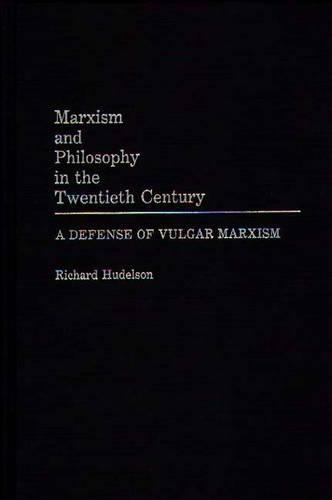
Marxism and Philosophy in the Twentieth Century: A Defense of Vulgar Marxism
(Hardback)
Publishing Details
Marxism and Philosophy in the Twentieth Century: A Defense of Vulgar Marxism
By (Author) Richard Hudelson
Bloomsbury Publishing PLC
Praeger Publishers Inc
25th September 1990
United States
Classifications
Tertiary Education
Non Fiction
Left-of-centre democratic ideologies and movements
335.411
Physical Properties
Hardback
272
Width 156mm, Height 235mm
624g
Description
Useful to both students and scholars of the social sciences and humanities, this book provides a guide to fundamental issues in twentieth-century Marxist thought. Outlining the two distinct and incompatible critiques of vulgar Marxism-- Marxist-Leninism and humanistic Marxism--that gained prominence in the aftermath of World War I, this book presents both an historical overview of these two dominant traditions and a critical analysis of their philosophical roots. Challenging the viewpoints of Marxist thought which have prevailed in this century, Richard Hudelson, argues that the supposed philosophical breakthroughs claimed by both Marxist-Leninism and humanistic Marxism rest upon flawed reasoning. With a careful critique of these prevailing views he presents his own view which while receptive to the social scientific work of current analytical Marxism, de-emphasizes the importance of philosophy in the study of Marxism. Hudelson contends that developments in contemporary philosophy of science will allow for an appreciation of the scientific Marxism of the Second International without recourse to the philosophical theories of humanistic Marxism and Marxist-Leninism. Also, using some of the more recent developments in the philosophy of science, this book makes possible a fruitful exchange between analytical Marxism and Marxist-Leninism. Divided into three parts, the book first presents a historical introduction which identifies positions and arguments of historical significance. This is followed by an analytical look at various arguments to determine where the strongest position lies. Finally, the author offers some concluding remarks on the significance of his analysis for current directions within Marxist philosophy.
Reviews
Is Marxism still a useful or even a tenable position Hudelson (University of Minnesota--Duluth) argues that it is, but not in either of its two common 20th-century forms. He holds both Marxist-Leninism and humanistic Marxism to be misguided interpretations. What is viable is the sort of 'vulgar' Marxism that dominated the Second International at the turn of the century and has reappeared in the last decade as analytical Marxism. He sees in Marxism not so much a philosophy as a social science whose centerpiece is the theory of capitalism. To develop these themes he discusses in a clear and insightful way the historical development of this century's Marxisms and what he judges as their main philosophical weaknesses. More positively, he contends that Marx's economics is an empirical science in a standard Western sense. Although he is obviously familiar with the range of Marxist literature and presupposes some familiarity with it, he does not overwhelm the reader with details. Useful to advanced undergraduates, but only for libraries that seek to cover Marxist thought in depth.-Choice
"Is Marxism still a useful or even a tenable position Hudelson (University of Minnesota--Duluth) argues that it is, but not in either of its two common 20th-century forms. He holds both Marxist-Leninism and humanistic Marxism to be misguided interpretations. What is viable is the sort of 'vulgar' Marxism that dominated the Second International at the turn of the century and has reappeared in the last decade as analytical Marxism. He sees in Marxism not so much a philosophy as a social science whose centerpiece is the theory of capitalism. To develop these themes he discusses in a clear and insightful way the historical development of this century's Marxisms and what he judges as their main philosophical weaknesses. More positively, he contends that Marx's economics is an empirical science in a standard Western sense. Although he is obviously familiar with the range of Marxist literature and presupposes some familiarity with it, he does not overwhelm the reader with details. Useful to advanced undergraduates, but only for libraries that seek to cover Marxist thought in depth."-Choice
Author Bio
RICHARD HUDELSON teaches courses in philosophy and humanities at Duluth Community College Center, the College of St. Scholastica, and the University of Minnesota, Duluth. He has published a number of articles and reviews on Marxism and related topics.
